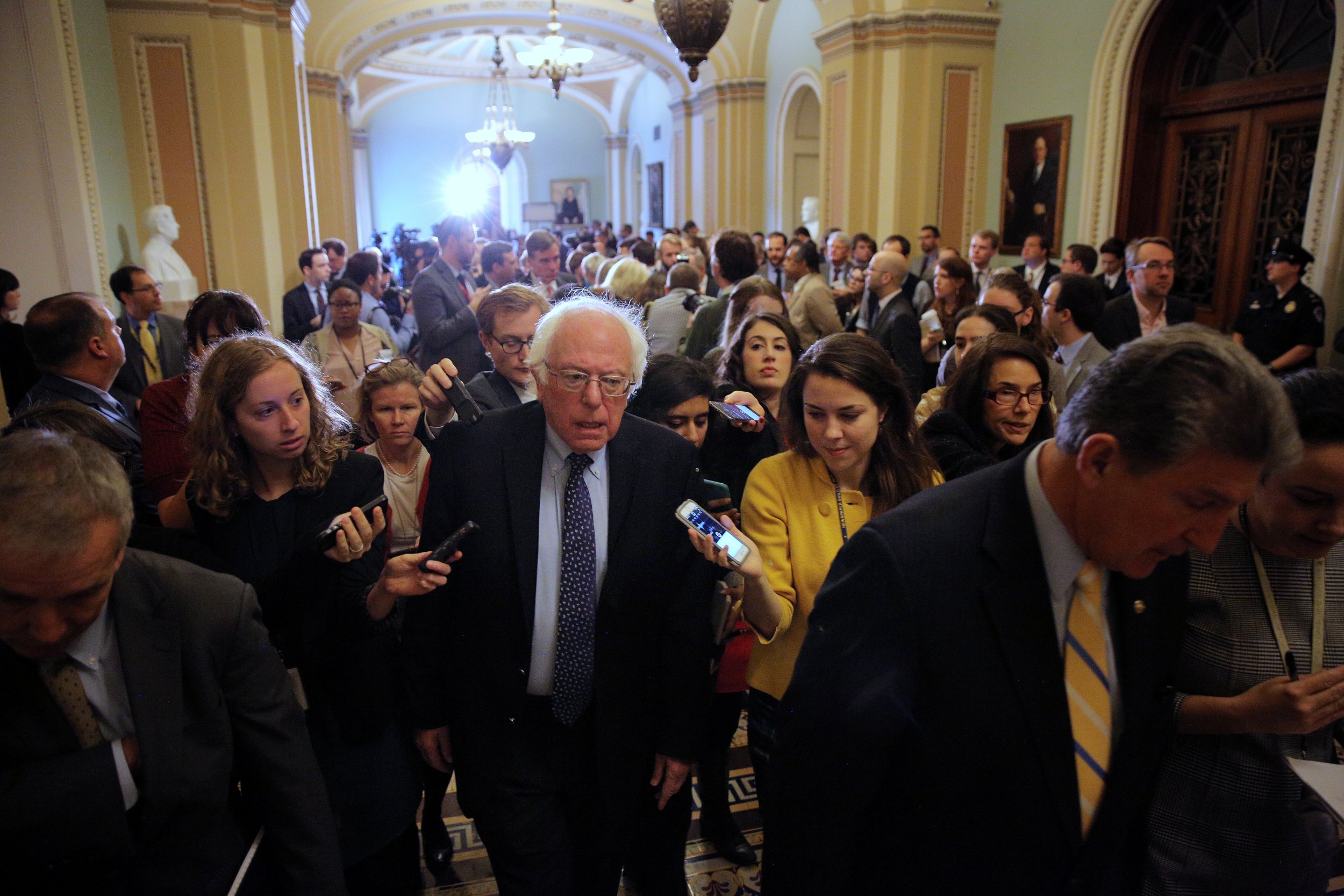
Vermont Senator Bernie Sanders is on a mission to use his national network of supporters and his new position in the Senate leadership ranks to draw more people into the political process, particularly the young and working people who flocked to his insurgent Democratic primary campaign. In the process, he thinks he can reform a party still in shock after its devastating election losses.
During a breakfast Thursday morning in Washington, D.C., the longtime independent lawmaker deflected reporters' questions as to whether he considers himself the de facto leader of the Democratic Party. In the wake of Hillary Clinton's defeat in last week's election and the party's failure to take back Congress from the Republicans, though, the progressive gadfly clearly sees himself in the middle of the discussion on bringing Democrats back from the brink.
Senate Democrats on Wednesday elected Sanders their "chair of outreach," a new position in the party leadership. What that means, in practice, remains unclear, Sanders acknowledged Thursday. "That's exactly what we're thinking about right now," said Sanders, the featured guest at a breakfast hosted by The Christian Science Monitor. The senator's starting point for his new post is the belief that, as he put it, "the real action to transform America is not going to take place on Capitol Hill. It's going to take place in grass-roots America."
He continued, "I initially understand my role to be to bring those people into the political process, to demand that the United States Congress, the United States government, the president represent the needs of all of the people and not just the people at the top. So I'm really excited."
Thanks to his unexpectedly competitive challenge against Clinton in the Democratic primaries, Sanders now has a platform to do just that. His two Twitter accounts (one for the Senate, one for his presidential bid) have 3 million and 4.2 million followers, respectively. His new advocacy organization, Our Revolution, has an email list numbering in the millions and is built off all the people around the country who volunteered for and donated to his primary campaign.
Sanders's new position, along with the appointment of fellow progressive Senator Tammy Baldwin of Wisconsin and the reappointment of Massachusetts Senator Elizabeth Warren to junior leadership positions, represents an effort by the party establishment to elevate voices from the left wing and demonstrate it is listening to voters outside of Washington. But the new Democratic leadership also includes moderate Democrats like Virginia Senator Mark Warner and West Virginia Senator Joe Manchin, underscoring the balancing act facing new Senate Minority Leader Chuck Schumer of New York.
Sanders reiterated his support for Schumer, whose ties to New York's financial industry have drawn scrutiny from progressives who worry he'll be too aligned with Wall Street and corporate interests. "Chuck is, in the best sense of the word, a very good politician. He knows how to bring people together, he knows how to seize the moment," Sanders said Thursday morning. "His job is to bring together diverse points of view within the Democratic Party."
Sanders made clear, however, that he plans to play a very different role in the party. He wants Democrats to pick sides. "I think at the end of the day the Democratic Party has to make a fundamental decision, and it goes back to an old song by Woody Guthrie…'Which Side Are You On?'
"It is not possible," the senator continued, "to be a candidate of corporate America, not possible to be a candidate of the insurance companies or Wall Street, not take huge amounts of money from powerful special interests and then say, 'Well, I'm going to champion the needs of a declining middle class.' I don't think you can do that."
Sanders said he was speaking only for himself, but it was hard not to hear his words as a stinging critique of the Clinton campaign, which received the vast majority of Wall Street donations in the 2016 race and raised millions of dollars from other special interest groups as well as lobbyists. "The time is now for the Democratic Party to say, We're going to stand with the working family in taking on the billionaire class," Sanders declared.
It's a message he delivered regularly on the campaign trail last winter and spring, and it's one he is now positioned to drill into the party and its voters.
Uncommon Knowledge
Newsweek is committed to challenging conventional wisdom and finding connections in the search for common ground.
Newsweek is committed to challenging conventional wisdom and finding connections in the search for common ground.
About the writer
Emily spearheads Newsweek's day-to-day coverage of politics from Washington, D.C. She has been covering U.S. politics, Congress and foreign affairs ... Read more
To read how Newsweek uses AI as a newsroom tool, Click here.






